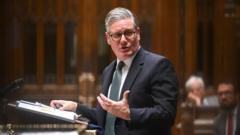In a significant shift in policy direction, the UK government has committed to implementing cuts to welfare spending, a controversial move intended to mitigate rising costs while addressing the challenges of a sluggish economy and increased military spending needs. Liz Kendall, the Secretary of State for Work and Pensions, presented the government’s strategy in Parliament, aimed at not only reducing expenditure but also encouraging the workforce and protecting the vulnerable.
UK Government Proposes Welfare Cuts Amid Economic Strain

UK Government Proposes Welfare Cuts Amid Economic Strain
Amidst rising welfare costs, the UK government plans to overhaul support programs, a move that raises concerns among Labour Party members.
The announcement comes after extensive discussions within the Labour Party, traditionally seen as the champion of the UK’s welfare state. The party is striving to balance the necessity of fiscal responsibility with social obligations. Kendall emphasized that current spending on welfare is unsustainable, stating that decisive steps are essential to transition more working-age individuals into jobs. The government aims to save five billion pounds (approximately $6.5 billion) by 2030 through these reforms.
Presently, there are over 9.3 million working-age people who are not in employment across the UK, a figure that reflects an alarming increase since the COVID-19 pandemic. About 2.8 million individuals are dependent on long-term sickness payments. Without intervention, projections suggest this number could rise substantially, further straining public finances.
The Treasury is under mounting pressure to enhance military funding and address the shortcomings of essential public services such as health care, which are grappling with underfunding. As the government prepares to navigate these complex issues, the proposed welfare cuts are poised to ignite further debate over the role of the state in providing support to its citizens, especially the most vulnerable.
Presently, there are over 9.3 million working-age people who are not in employment across the UK, a figure that reflects an alarming increase since the COVID-19 pandemic. About 2.8 million individuals are dependent on long-term sickness payments. Without intervention, projections suggest this number could rise substantially, further straining public finances.
The Treasury is under mounting pressure to enhance military funding and address the shortcomings of essential public services such as health care, which are grappling with underfunding. As the government prepares to navigate these complex issues, the proposed welfare cuts are poised to ignite further debate over the role of the state in providing support to its citizens, especially the most vulnerable.






















